Five Reasons Every Teen Should Go To Summer Camp
By Audrey “Sunshine” Monke. Originally published at Sunshine Parenting
#1 Improve Interpersonal Skills & Form Close Friendships
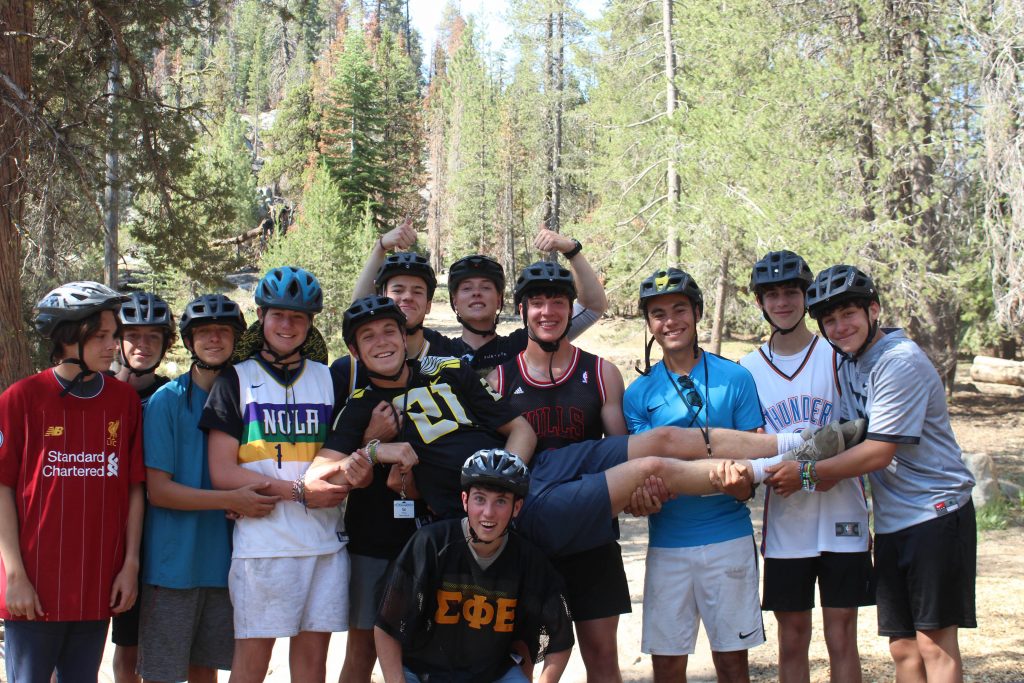
“In a … study of 515 senior executives, emotional intelligence was a better predictor of success than either relevant previous experience or high IQ.” -Forbes, “Look for Employees with High EQ over IQ”
In a world where anyone can look up a fact or equation and where machines are replacing even complex workplace tasks, employers need employees who can interact effectively with other people. This is one of the most important skills teens learn at camp. In the unplugged, non-competitive camp culture, teens build up their “emotional intelligence” (EQ), their face-to-face communication and relationship skills. 21st-century employers need people who can communicate, collaborate, and cooperate with others, and teens who come to camp get to practice those skills every day.
If you are debating whether your teen can miss a few weeks of SAT prep or a summer academic program, know that the 1600 SAT score will never outweigh the important communication and relationship skills he or she will develop at camp. Whether on a backpacking trip, cheering each other through a ropes course, or chatting around the campfire, the interpersonal skills teens build are the same ones they’ll need to be successful adults in families, communities, and companies.
#2 Take Safe Risks and Challenges
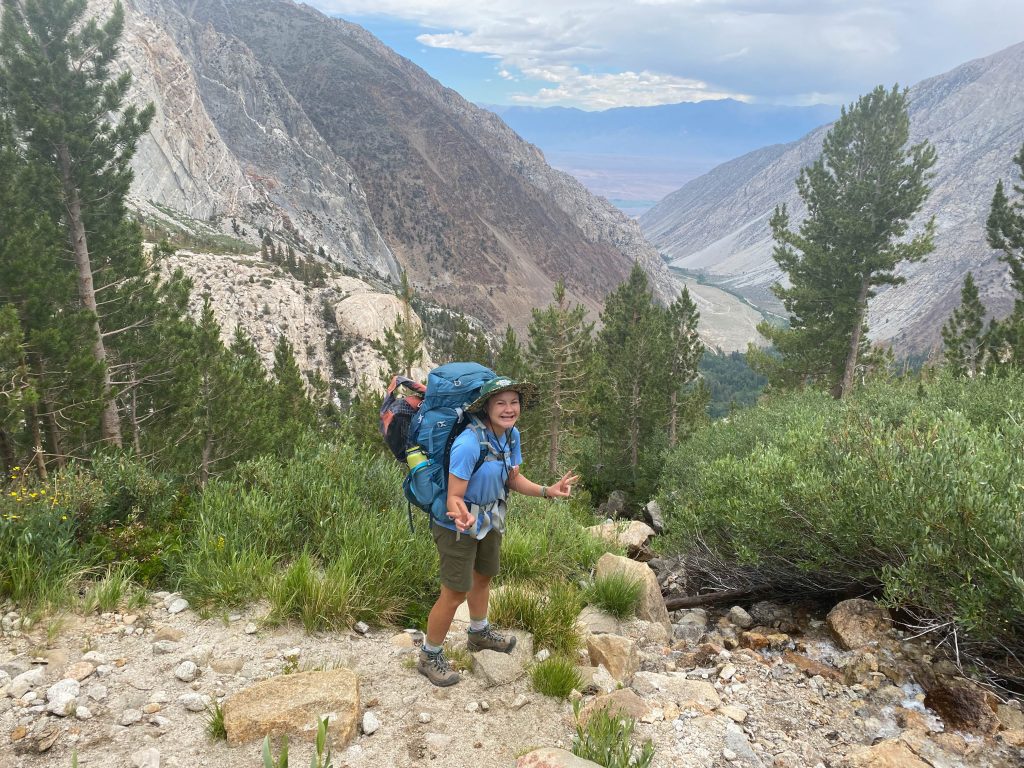
Teens thrive on risk. Thanks to recent findings (described in Age of Opportunity and Brainstorm) about the unique attributes of the teen brain, we now understand the reason for the “mortality bump” for 17-year-old boys. They do stupid, daring things not because they aren’t aware of the dangers, but because—to them—the reward of leaping from a rocky cliff or speeding along a curvy mountain road seems to outweigh the risk.
A teen at camp has the opportunity to take many safe, controlled risks. Climbing to new heights on a rock wall or ropes course, jumping the wake of a boat on a wake board, or reaching the peak of a 10,000-foot summit are all healthy risks teens take at camp. Plus, being in a controlled camp environment frees teens from exposure to health risks like alcohol and drug use.
#3 Experience Character Growth and Develop Life Skills
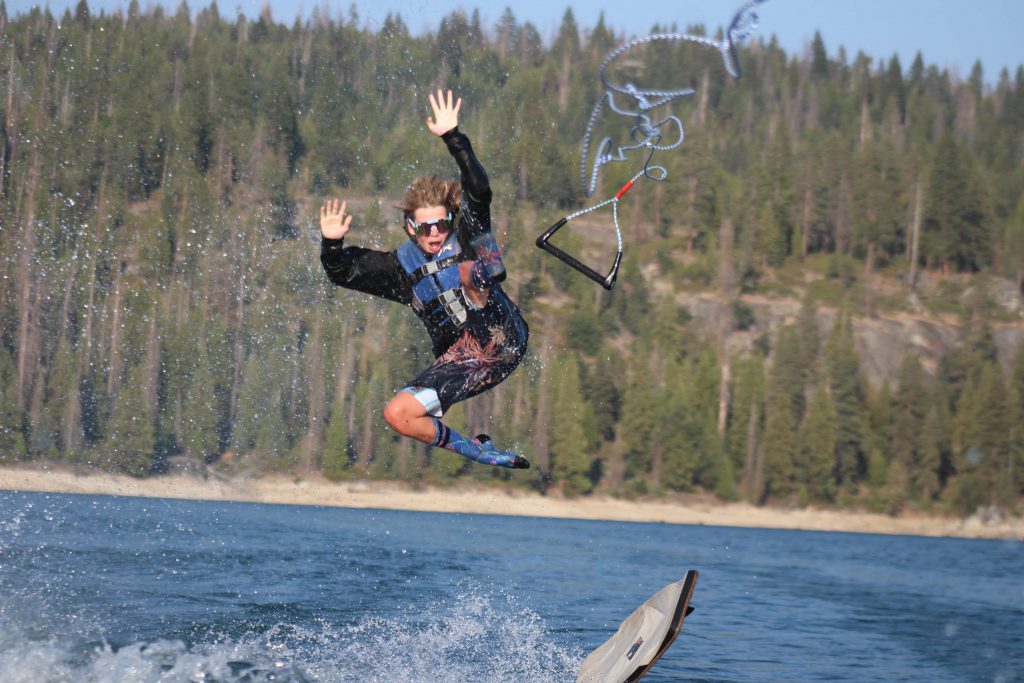
“A profound gap exists between the knowledge and skills most students learn in school and the knowledge and skills they need for success in their communities and workplaces.” –Partnership for 21st Century Skills
Schools aren’t doing a very good job teaching kids grit, perseverance, and leadership. But that’s not their job. Rather, schools are VERY busy teaching the core curriculum and assessing how well our kids know it. No school has time to see how “gritty” a kid is, but at camp, the “grit-meter” is always running, and it’s personal character—not a report card or an athletic achievement—that rises to the top.
Teens also develop other important life skills at camp, including independence, responsibility, and decision-making. Teens grow considerably in an environment away from their parents where they are forced to live on their own and find their own resources.
#4 Meet Positive Role Models
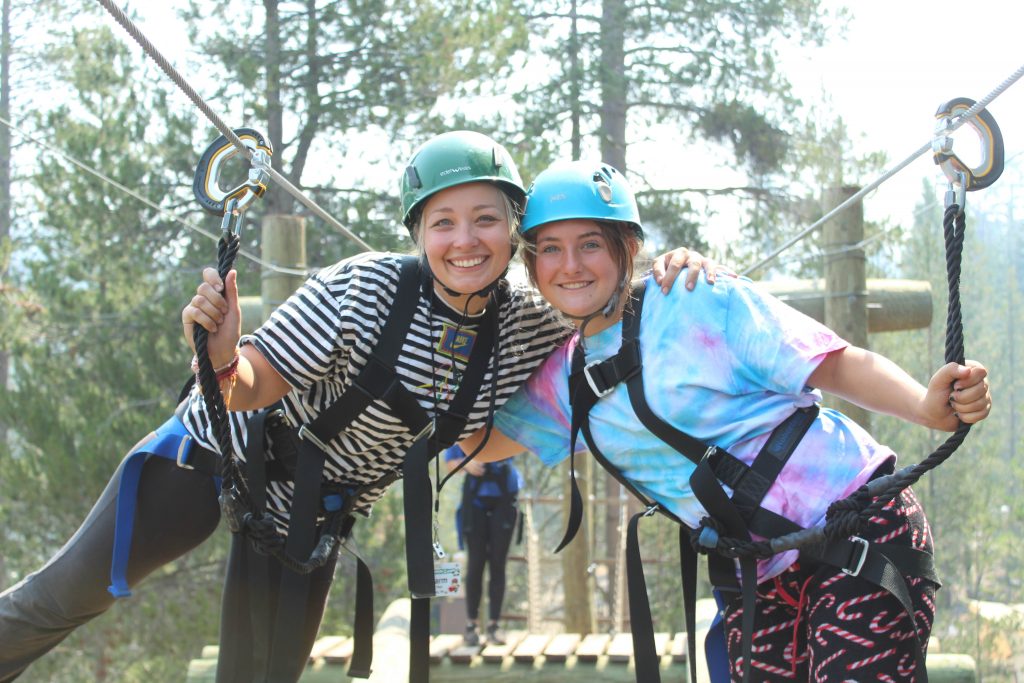
Watch or listen to a popular music video, reality TV show, or sports event, and you’ll be hard-pressed to find positive young adults teens can emulate. But walk into any well-run summer camp and you’ll be surrounded by wholesome, outdoorsy young people who like being around others and doing fun activities. Camp offers teens the opportunity to be among young adults who are positive role models and to form close relationships with them. Most camp counselors are hard-working college students who want to serve others. They are friendly, personable, and are just the kind of young adults you want your teen to become.
#5 Discover Their Best Self
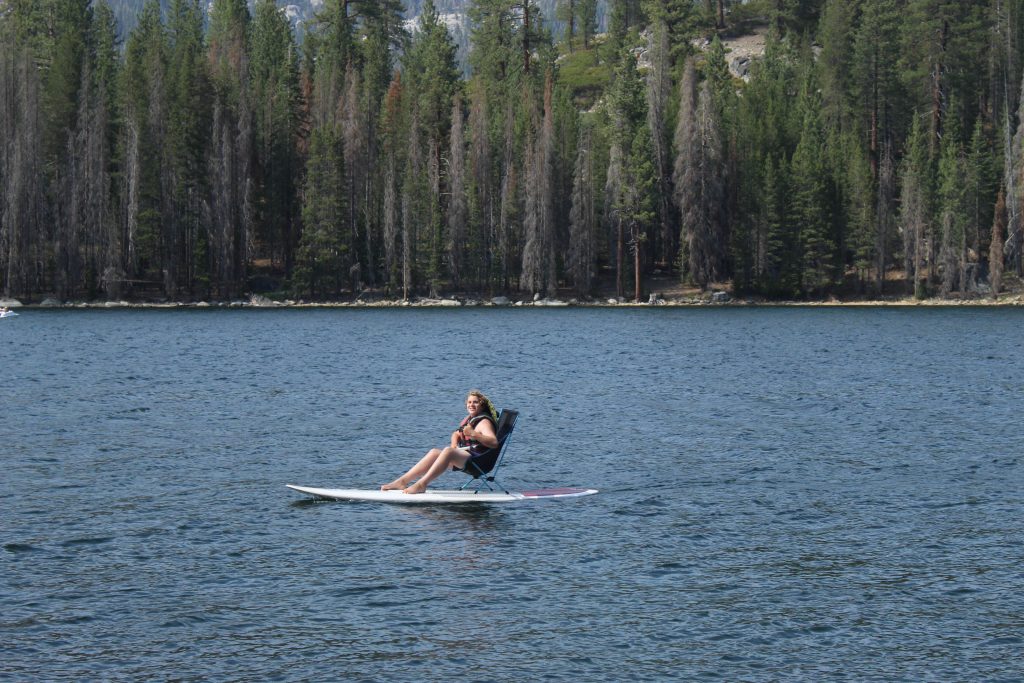
We live in a world where teens—often by their own parents—are steered towards success via the SAT, the college admissions grind, a “good” major, and a high-salary job. Look around at many adults, however, and see where that path got them. Despite knowing better, we still expose our kids to the same gauntlet.
Perhaps college education is the best option for most young people, but I’ve met many who are halfway done (or all the way done) and still don’t know who they are or what they are passionate about. Camp experiences offer teens the chance to step back from the treadmill of academics, competitive sports, and their sleep-deprived, over-scheduled existence, and instead think about what’s important to them. Many campers become less self-absorbed after spending a few weeks at camp, learning to train their focus on others. They also discover new hobbies and avenues to pursue in education and their future careers.
Each summer, tens of thousands of teens leave their phones and car keys at home and head to summer camp as campers, counselors in training, or counselors. Many teens who have never been to camp cannot relate to how a teenager could make such crazy personal sacrifices. And yet, teens are the age group that fills most quickly at many camps. Because, perhaps more than any other time during youth, camp offers the respite, recreation, and renewal to help teens thrive. Teens who have already been to camp know this and want to come back, year after year.

Gold Arrow Camp offers a Junior Counselor Program for returning GAC campers and an Outdoor Leadership Course for teens (grades 9th-11th).
Originally published at Sunshine Parenting.
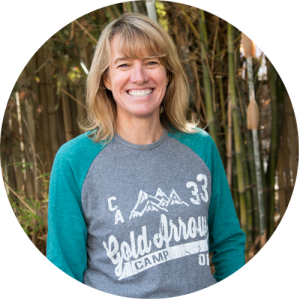
Audrey “Sunshine” Monke, MA, has been the owner of Gold Arrow Camp since 1989 and currently serves as the Chief Visionary Officer. In addition to her vision-casting and mentoring at GAC, Sunshine is an author (Happy Campers: 9 Summer Camp Secrets for Raising Kids Who Become Thriving Adults), podcast host, speaker and coach on the topics of parenting, social skills, and happiness. Find out more at her website, Sunshine Parenting.
Visit Sunshine Parenting for more summer camp-related posts & podcast episodes.
The Gift of Handwritten Letters
Recently, I’ve been going through the many boxes of letters, photos, and memorabilia which I have collected over my first five decades. It’s been a time-consuming task, but I’m trying to organize into a smaller number of boxes what has been accumulated over the first half of my life. What has struck me most is the huge number of letters I amassed from my childhood, high school, and college friends. Until this week, I didn’t remember how much we corresponded, but I just finished going through hundreds of letters. I now have proof of the many friendships that were solidified over hours of writing to one another.
I mostly have the ones written to me, but I can assume from the “Thanks for your letter”s that I was writing at the same rate as my friends were. Maybe some of my letters are in a box out there somewhere?
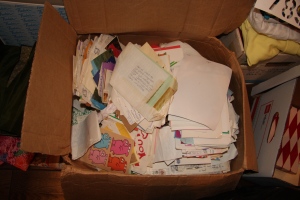 Not only was there a huge volume of letters (see picture), some of the letters were ten pages long, with tiny writing. Others were short notes or fun greeting cards. Most of them were in beautiful, cursive writing, even some from boys! What an amazing thing to think about. Back then, without the distractions we all have today, we had TIME to write letters like that! Plus, we enjoyed it and we were good at it! We wrote letters because often long-distance phone calls were too expensive. Many of us traveled and studied overseas, so the letters chronicle our trips.
Not only was there a huge volume of letters (see picture), some of the letters were ten pages long, with tiny writing. Others were short notes or fun greeting cards. Most of them were in beautiful, cursive writing, even some from boys! What an amazing thing to think about. Back then, without the distractions we all have today, we had TIME to write letters like that! Plus, we enjoyed it and we were good at it! We wrote letters because often long-distance phone calls were too expensive. Many of us traveled and studied overseas, so the letters chronicle our trips.
The process of trying to get rid of most of this paper required that I at least skim through each one. I pulled out many that I simply can’t bear to throw away. I found letters from my late grandparents, with their words of wisdom. I found letters my parents had written to me over the years. I also found letters from friends showing major teen angst, which is a good reminder now that I have teens of my own. We weren’t that different back then after all! It’s just that we didn’t splash our anger and sadness at each other on Facebook. We wrote each other heartfelt notes.
One thing I realized is that my kids will not have a big box of letters like mine. They don’t write letters like we did in the pre-computer, pre-email, pre-social networking, pre-cell phone era. But then I had a revelation! They DO still get to send and receive letters. It’s when they’re at camp! I have told parents how much campers enjoy getting “real” mail while at camp (the kind with a stamp), but now I have realized another benefit – they will have these letters as keepsakes and memories of their childhood. And you, as parents, most definitely should save all of the letters you get from your camper!
Among my box, I came across a postcard I sent to my parents in 1977, when I was a camper at Gold Arrow Camp. This is what it said:
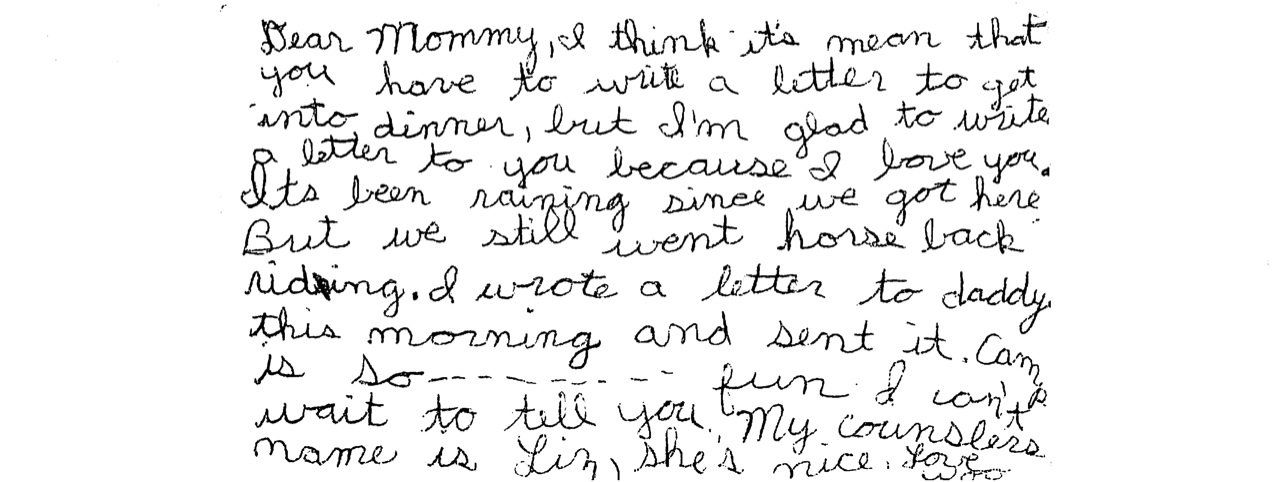
My postcard home from camp, 1977.
“Dear Mommy,
I think it’s mean that you have to write a letter to get into dinner, but I’m glad to write a letter to you because I love you. It’s been raining since we got here. But we still went horseback riding. I wrote a letter to daddy this morning and sent it. Camp is so fun. I can’t wait to tell you. My counslers name is Liz. She’s nice.
Love, Audrey”
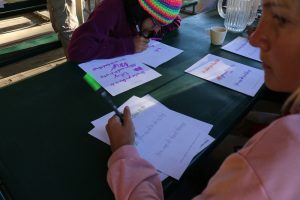 Let me tell you, we have gotten some good laughs in our house over this postcard. Not just about how I spelled “counselor,” but about my comment about the “Mail Meal” (dinners on Wednesday and Sunday that you need to have a letter or postcard home as your ticket in). The dreaded “Mail Meal” has been a camp tradition for as long as anyone can remember, but I didn’t even remember thinking it was a bad thing. My adult view is much different than my ten-year-old one! I now understand how much parents need those letters. I hope most kids get beyond the “I have to write this letter” part, and share some of their feelings and memories of camp. The resulting memorabilia will be priceless.
Let me tell you, we have gotten some good laughs in our house over this postcard. Not just about how I spelled “counselor,” but about my comment about the “Mail Meal” (dinners on Wednesday and Sunday that you need to have a letter or postcard home as your ticket in). The dreaded “Mail Meal” has been a camp tradition for as long as anyone can remember, but I didn’t even remember thinking it was a bad thing. My adult view is much different than my ten-year-old one! I now understand how much parents need those letters. I hope most kids get beyond the “I have to write this letter” part, and share some of their feelings and memories of camp. The resulting memorabilia will be priceless.
So, here’s to another benefit of camp I’ve only this week realized. We have the chance for our kids to experience the (almost) lost art of writing and receiving handwritten letters. And you, as a parent, have a chance to write down words that your child will be able to read and keep long beyond any email you’ve sent them!
P.S. Did you see this hilarious book? P.S. I Hate it Here: Letters from Camp It is full of some really funny, real letters kids wrote to their parents from camps.
National Public Lands Day
National Public Lands Day is September 25, 2021! NPLD is a great way to connect with nature and give back to our public lands. There are many opportunities to help restore and improve public lands across the country. For more information about National Public Lands Day and to find an event near you, visit https://www.neefusa.org/npld.
If you participate in NPLD, please send us a picture to mail@goldarrowcamp.com or tag us in your social media posts!
Mini Camp & Shaver Specialty Video Highlights & Slideshow
Check out some fun highlights and memories from Mini Camp and August Specialty! These sessions were such fun ways to end another GAC summer!
Whadda Week! August 23, 2021
Frames and Cabin 3 host this week’s episode of WHADDA WEEK! We’ve started off Mini Camp/Shaver Specialty Week with tons of fun and we look forward to packing our next few days together with activities and special events.
Podcast: Play in new window | Download
Subscribe: Spotify | Email | RSS
Bears’ Adventure – Session 4
A highlight of the two-week session for our youngest campers (grades K-3), and their version of “backpacking,” is Bears’ Adventure. This one-night trip allows campers to experience sleeping outdoors under the stars and cooking over a campfire. Campers’ luggage is taken for them to the campsite, so they are not technically “backpacking,” because they have no pack to carry. With just their water bottle and their positive attitudes, they set out from camp singing and talking on their hike.
The best part of Bears’ Adventure is the free time kids get to play and explore the area. For many campers, the longer sticks provide the perfect start to a fort. Others enjoy laying on their sleeping bags talking with friends or silently watching clouds move overhead. Some participate in crafts and games while enjoying being outdoors. For many of these kids, Bears’ Adventure is their first experience “roughing it,” and they absolutely love it.
When they hike back into camp the morning after their Adventure, our Bears’ campers stand a little taller. And their dirty, smiling faces are the best indication that they have experienced the awe of nature.
Video & Photo Highlights from Session 3 Bears Adventure
How Camp Teaches 21st Century Skills
“A profound gap exists between the knowledge and skills most students learn in school and the knowledge and skills they need for success in their communities and workplaces.”
-Partnership for 21st Century Skills
“Having started at Gold Arrow as a little seven year old, I have grown up here. Camp has become my home away from home, and I can honestly say it has shaped who I am today. It has given me confidence and taught me skills far beyond learning how to wakeboard or horseback ride. I am comfortable with myself, I am patient, and I have learned how to become a leader.”
-Katie “Rascal” Baral, 10 year Camper
Parents, educators, and youth development professionals are well-versed in the phrase “21st Century Skills.” The phrase encompasses our current understanding of the urgent need for our children to be learning more than how to read, write, and do math. There are many other skills needed to grow into productive, successful adults. As I look at the list of 21st Century Skills, I am struck by how many of the skills are intentionally modeled and taught at camp. Following are five specific 21st Century skills that children learn at camp:
Working Creatively with Others
Campers learn to work creatively with others through working towards goals with their cabin group. Even something as simple as collaborating on a skit, song, or dance requires being open and responsive to different perspectives and incorporating group input. An important aspect of creativity and innovation is being able to “view failure as an opportunity to learn.” At camp, with every new and challenging activity, campers are encouraged to challenge themselves and persevere past failure. They learn that “creativity and innovation is a long-term, cyclical process of small successes and frequent mistakes.”
Communication
From the moment they arrive at camp, campers have the opportunity to practice and hone their communication skills. Gathered around the campfire on the first evening, campers talk about themselves in front of their small cabin group. They also listen to others share about themselves. At meals, campfires, and while walking around camp and participating in activities, counselors guide discussions about deeper issues and make sure all campers participate, even those who are less outgoing. Listening skills are addressed and enhanced through practice. Without the distractions and escape of technology, campers practice articulating thoughts and ideas and listening to the ideas of others throughout their time at camp.
Collaboration
When working together at Team Building, during cabin clean up, or while preparing for a performance, campers learn important collaboration skills. They learn that they need to be flexible. They often learn another important collaboration skills, which is that it is often necessary to make compromises to accomplish a goal. Counselors encourage campers to share responsibility for tasks and work together. Campers are also encouraged to value and acknowledge each individual contribution made by team members.
Social and Cross-Cultural Skills
Learning to interact effectively with others is an important social skill that doesn’t come naturally to all people. At camp, counselors guide campers to learn when it is appropriate to listen and when it is appropriate to speak. Counselors also require that campers respectfully listen to others’ opinions and treat others with respect.
For many campers, their time at camp is their first opportunity to meet and live with people from other cultures. Camp offers the opportunity for kids to form friendships with staff and campers from other countries. Camp provides the opportunity for campers to gain a respect for and work effectively with people from a range of cultural backgrounds. On International Day each session, we celebrate and learn about our international campers and staff.
Leadership and Responsibility
Guiding and leading others is an important 21st Century skill. In campers’ early years at camp, they learn basic responsibility for themselves and those around them. Even our youngest campers have the opportunity to lead others in a song or game. As they get older, campers gain more of an understanding of how their words and actions influence others, and they learn how to positively use their leadership skills.
While academics are important, children need other skills to be successful. Camp offers an ideal setting for campers to learn and enhance many of the non-academic 21st Century Skills. One line of our camp song says, “I sure did learn much more here than I ever did at school.” And, when learning is viewed as more global than the subjects listed on the report card, that is an incredibly profound and true statement.
Read about all of the 21st Century Skills at www.p21.org.

Audrey “Sunshine” Monke, MA, has been the owner of Gold Arrow Camp since 1989 and currently serves as the Chief Visionary Officer. In addition to her vision-casting and mentoring at GAC, Sunshine is an author (Happy Campers: 9 Summer Camp Secrets for Raising Kids Who Become Thriving Adults), podcast host, speaker and coach on the topics of parenting, social skills, and happiness. Find out more at her website, Sunshine Parenting.
Visit Sunshine Parenting for more summer camp-related posts & podcast episodes.
WHADDA WEEK! August 14, 2021
Bravo, Soap, and the members of Cabin 24 (with a guest appearance by some of Cabin 22) host this week’s episode of WHADDA WEEK! Find out what’s happening at GAC this second week of Session #4, learn about some highlights of camp so far for these kids, and hear about some of the friendship skills that they’ve been practicing.
Podcast: Play in new window | Download
Subscribe: Spotify | Email | RSS
Bears’ Adventure
A kid today can likely tell you about the Amazon rain forest – but not about the last time he or she explored the woods in solitude, or lay in a field listening to the wind and watching the clouds move.
-Richard Louv, Last Child in the Woods
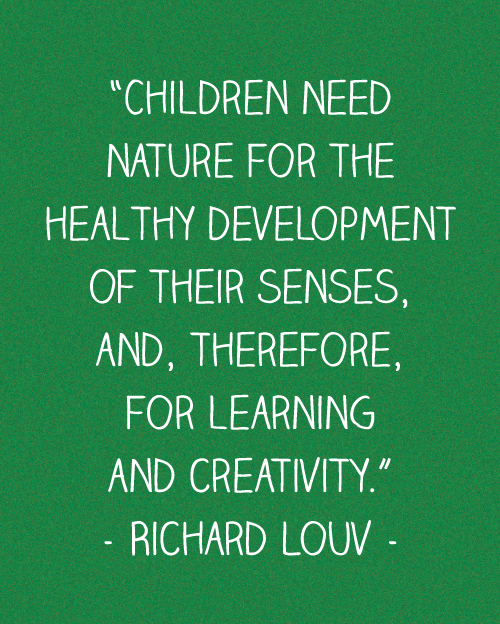 At GAC, “getting outside to experience the awe of nature” is one of our core values. Many of our campers, who primarily live in cities or suburbs, have never had the opportunity to live in and experience nature up close. The rustic set-up of our living areas, which are large tents on wood platforms, allows campers the feeling of being close to nature throughout their stay at camp. With no electricity (and the distractions inherent with being plugged into technology), campers truly get to experience living outdoors. From their tents, campers can hear birds chirping, the water running in the creek, and the breeze rustling the tree branches. Evenings include relaxing chats and stories around the campfire while the sun sets and the stars come out overhead.
At GAC, “getting outside to experience the awe of nature” is one of our core values. Many of our campers, who primarily live in cities or suburbs, have never had the opportunity to live in and experience nature up close. The rustic set-up of our living areas, which are large tents on wood platforms, allows campers the feeling of being close to nature throughout their stay at camp. With no electricity (and the distractions inherent with being plugged into technology), campers truly get to experience living outdoors. From their tents, campers can hear birds chirping, the water running in the creek, and the breeze rustling the tree branches. Evenings include relaxing chats and stories around the campfire while the sun sets and the stars come out overhead.
Campers experience the wonder of nature from the moment they arrive at camp, but there’s just nothing quite like being really far from “civilization” and even further out into nature. Because we’ve experienced how life-changing it is for campers, getting our campers even deeper into the woods is also a priority. With even fewer distractions than what they experience at main camp, our backpacking program serves the purpose of getting our campers completely immersed in nature. For campers who have completed 4th-5th grades (our “Tigers” age group), their cabin group is scheduled for a one-night overnight backpacking trip. Campers get to experience exploring, sleeping, cooking, and living in an even more rustic setting than their camp tent home. I wrote about one of these magical Tigers’ backpacking trips in my post, “Nature Pees and Lanyard Fishing Poles.” Our older campers, the Lions and Eagles (who’ve completed 6th-9thgrades), have the option of signing up for a backpacking trip, one of the most popular choice options for their free choice days.
But a highlight of the two-week session for our youngest campers (grades K-3), and their version of “backpacking,” is Bears’ Adventure. This one-night trip allows campers to experience sleeping outdoors under the stars and cooking over a campfire. Campers’ luggage is taken for them to the campsite, so they are not technically “backpacking,” because they have no pack to carry. With just their water bottle and their positive attitudes, they set out from camp singing and talking on their hike. Once they get to their destination, which feels far from camp (although it is less than a mile away), they are rewarded with a spectacular view of Huntington Lake and the surrounding wilderness area. They truly get the feeling that they have been on a long, adventurous hike.
The best part of Bears’ Adventure is the free time kids get to play and explore the area. For many campers, the longer sticks provide the perfect start to a fort. Others enjoy laying on their sleeping bags talking with friends or silently watching clouds move overhead. Some participate in crafts and games while enjoying being outdoors. For many of these kids, Bears’ Adventure is their first experience “roughing it,” and they absolutely love it.
When they hike back into camp the morning after their Adventure, our Bears’ campers stand a little taller. And their dirty, smiling faces are the best indication that they have experienced the awe of nature.
Whadda Week! August 2, 2021
Bravo and Cabin 24 host this week’s episode of Whadda Week. Find out what’s going on this second week of Session #3, 2021!
Podcast: Play in new window | Download
